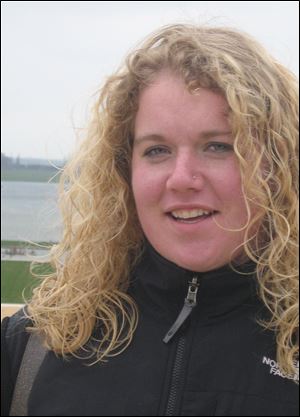
Sylvanian awarded Fulbright scholarship
6/17/2009
McEwen
Molly McEwen went to Gonzaga University ostensibly to major in biology, but during study abroad in Germany her junior year, she fell in love with that country and its culture.
Now the Sylvania woman, who graduated from the college in Spokane, Wash., last month, eagerly anticipates a return of at least 10 months, starting in September, when she'll teach English in the Bavarian town of Augsburg with a Fulbright scholarship paying her bills.
"I was just thrilled to death" by the selection, Miss McEwen said, noting that the scholarships, awarded by a presidentially appointed board, are known for their competitiveness and that this year's applicant field was likely to be tougher than ever because of the economy.
Many college students are pursuing scholarships or volunteering opportunities because they can't find jobs, she explained.
The scholarship will provide Miss McEwen with an 800 Euros-per-month stipend, plus health insurance and travel expenses to fly to Germany. The scholarship program is designed to promote mutual understanding between the peoples of the United States and 150 participating foreign countries.
In Miss McEwen's case, the Fulbright scholarship required her to speak German, which she had learned mostly by immersion during a semester in Munich that turned into full year of foreign study when she became smitten with Germany.
"I called home and said, 'I won't be coming home in January, I want to stay for the whole year,'•" she recounted. "My Mom wasn't too happy with me about that. I had to take out a loan to stay."
The year in Germany taught Miss McEwen how important learning English is to students there and in many other countries.
"In America, foreign language is something many students struggle through for two years in high school in order to be accepted at college, and then forget soon after graduating," she wrote in an essay that was part of her scholarship application.
"They are proud if, four years later, they can still remember the list of swear words that they had looked up in the dictionary during Spanish class. But for Europeans, foreign languages are an important part of a basic education."
Along with her studies that year, Miss McEwen worked for a month at an English-language camp for German children and, having played softball during her years at Sylvania Northview High School, joined a local softball team.
The latter made her an instant local sensation, she recounted in the Fulbright essay, much as expatriate Canadians raised playing hockey might become the stars of local teams in foreign lands where their sport is rare.
Miss McEwen completed the requirements for her biology degree - Gonzaga doesn't even offer a German major, she noted - but now she knew what she wanted to do after college: get back to Germany any way she could.
She was guided to apply for a Fulbright by a German friend whom she had helped with his English writing and by two Gonzaga alumni who had been in the foreign-study program two years earlier. Through them, she learned that scholarships were available not only for graduate-level study, but also for teaching abroad.
Besides being a teaching assistant in an Augsburg classroom, Miss McEwen hopes to coach youth baseball or softball while in Germany.
"Because there are so many English terms used in the game, baseball is a perfect way to learn a practical application of English and to practice speaking it outside the classroom," she wrote. "We could even practice writing skills by creating advertisements for the newspaper to gain more members and by writing game summaries for our Web site."
Being an hour's drive from Munich should allow her to rejoin the Munich softball team with which she played last year too - assuming she can afford the travel. Eight hundred Euros per month won't provide for much in the way of discretionary spending.
"I'm praying to find a good deal on an apartment," she said. "And while I can't take any other jobs for which I would have to report taxes, there are a ton of people looking for English-speaking babysitters, or tutors for their children."
Miss McEwen said there's a decent possibility that when she returns to the United States, she'll seek certification to teach German here. But exactly when that might happen, she's not sure.
"My scholarship is good through the end of June, but you can apply for a second year," she said.